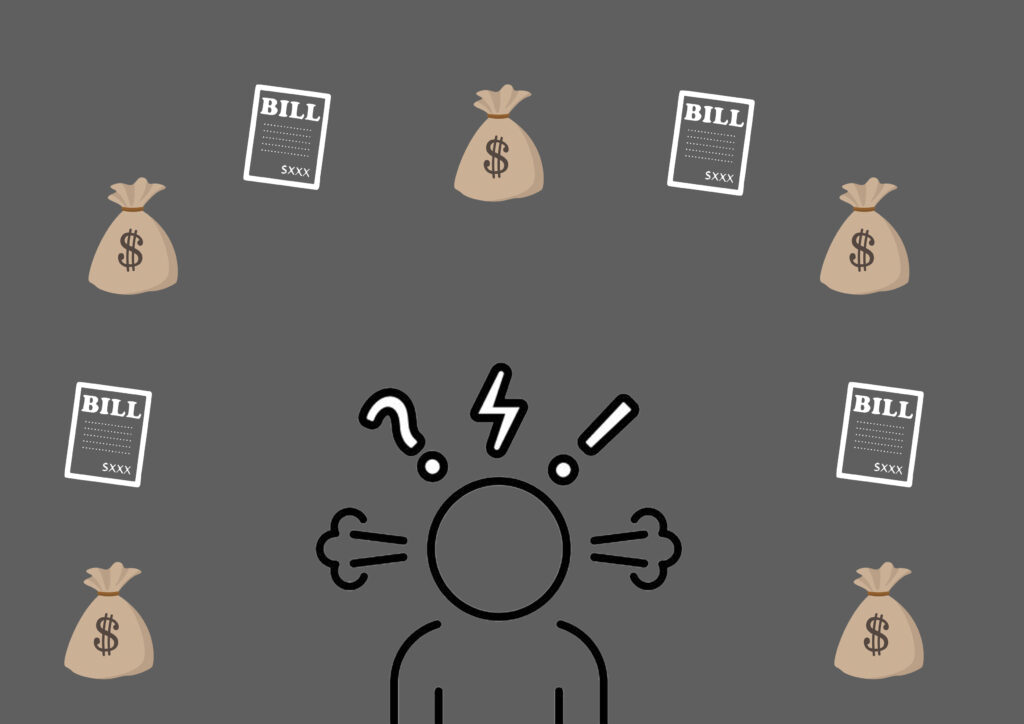It can be difficult to earn and manage money when you have poor mental health. And worrying about debt can make your mental health worse. It can start to become a vicious cycle.
Debt is something, usually involves money, borrowed by one party from another, this can include and individual like a family member or a friend or a corporation of any size small, medium or large. Debt is used by many to make large purchases that may not be affordable or an option to fund during normal circumstances. A debt arrangement gives the borrowing party permission to borrow money under condition that it is to be paid back later, usually with interest.
Key points:
- Many corporations and individuals use debt as a method of making large purchase or borrowing funds that they cannot afford at that time or due to circumstances they don’t have the funds available at that time.
- In a debt based financial arrangement, the borrowing party gets permission to borrow money under the condition that it must be paid back later, usually with interest.
The link between debt and mental health
Worries about money can have a huge impact on people’s mental health. And your mental health can affect those around you and how you manage your finances.
There are some common ways your mental health can affect the way you deal with money:
- feeling low or depressed, may lack motivation to take control of your finances. It might not feel worth trying.
- Spending without thinking, may give you a brief high on a short term, so you might overspend to feel better.
- People might make impulsive financial decisions when you’re experiencing intrusive thoughts.
- Mental health might affect your ability to work or study, this might reduce your income.
- People might avoid doing things to stay on top of their finances, like opening bills or checking their bank account statements. Some may try and avoid thinking about money completely.

Money problems can affect your mental health
Certain situations might trigger feelings of anxiety and panic when it comes to finances and debt especially. Many people may look fine on the outside but on the inside maybe be hiding the truth of their financial position and personal circumstances. Nobody enjoys being in debt and we as humans do tend to avoid debt and bury our heads in the sand until we can no longer face the truth.
There are some common ways money can affect your mental health:
- Worrying about money can lead to sleep problems.
- People might not be able to afford the things they need to stay well. This might be housing, food, water, gas, electric and heating to name a few that are important for day-to-day living.
- Money problems can affect people’s social life and relationships. You may feel lonely and isolated or feel like you can’t do the things you would like to.
- Feeling anxious when thinking about how long it will take to make repayments.
Why and how do people get into debt?
There is a common is understanding that people find themselves in debt to living an excessive lifestyle or going wild out shopping and spending without thinking with their credit cards. The truth is that unemployment and redundancy ae the most common triggers for debt problems and can happen to anyone no matter what their attitude to money may be.
Life changes such as losing your job, mental or physical health problems or separating from your partner can mean that you struggler to pay your household bills. A financial change can be difficult to adjust to.
How can mental health problems affect your finances?
There are many reasons why mental illness can make managing your money difficult.
If you’re depressed, you might have the energy or motivation to keep track of your money. If you’re going through a manic episode, you may make a rash or unwise decision with your spending. You may need time off work, or a hospital stay, you may be faced with a sudden reduction in income and difficulty keeping up with your bills.
Mental health problems may make it difficult for you to make financial decisions. Decision-making ability is known as mental capacity. If you don’t have mental capacity, someone may have to make decisions on your behalf.
How do I get help?
If you are dealing with debt problems, you’re not alone. You do not have to figure it out on your own. There are many organisations that are free of charge and have debt advisors to help you need to get back on track and form a pathway to debt free.
- Step change
- National Debt line
- Debt Support Trust
- Pay plan
- Christians against poverty
- Citizens Advice
The organisations mentioned wont judge and can help you find the ways to manage your debt. There are many ways to get in contact to discuss your options these include face to face, online or telephone. Getting advice can help you feel less anxious and stressed, allowing you to be more in control of your life again.
Whether it is a friend, relative, or someone who supports your mental health, speak with someone you trust. Talking can help you feel less hopeless and alone, plus they can help you make an appointment with a debt advisor if you need them to.
How can I help myself?
- Tell your creditors about your mental health. This can be a difficult decision and you need to be sure they will take you seriously and avoid explaining yourself repeatedly.
- Find out if you qualify for any schemes, that freeze any payments to allow you some breathing space.
- You could get debt and mental health evidence forms completed by a doctor or a healthcare professional. This can help make sure your creditors take your mental health into consideration.



